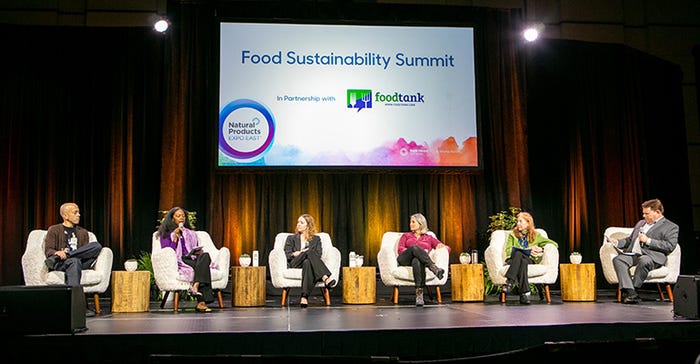
For regenerative agriculture to successfully restore soil and communities, the elements must work together as a system.
For the movement to gain momentum, the same is true for the various organizations promoting these ancient but trending methods: They must work together. And that's already happening, according to participants in the "Climate Crisis & Regenerative Agriculture" panel discussion during the Food Sustainability Summit at Natural Products Expo East.
Philadelphia Inquirer food writer Michael Klein moderated the discussion among five leaders of organizations that collaborate on their quest for a more regenerative future and a healthier food system.
Science—and doctors—are catching up
When J.I. Rodale founded his namesake institute 75 years ago, he based it on a simple line he scrawled on a chalkboard: Healthy soil equals healthy food equals healthy people. "The way we treat our soil has everything to do with the way we treat ourselves," said Rodale Institute Chief Impact Officer Jeff Tkach. Rodale applies hard science to regenerative farming, by conducting research and educating farmers, consumers and brands.
While Rodale was the modern pioneer of regenerative methods, the system is "rooted in indigenous communities that have been using it for thousands and thousands of years," said Kiss the Ground Policy Director Erica Campbell.
Today, Americans spend three times as much on healthcare as they do on food. Fifty years ago, those numbers were flipped, Tkach said. A few years ago, the Rodale Institute's "Power of the Plate" white paper brought medical doctors, farmers and scientists together to connect the dots. In a few weeks, the organization will hold an event that pushes the needle even further: The Regenerative Healthcare Summit will be the first healthcare summit held on a farm. More than 500 doctors vied for 60 slots at the conference.
"Doctors are so hungry for this knowledge," he said. "Our medical community needs to understand soil health, and that's what we're going to show them."

Brands and consumers are starting to get it
"NeilsenIQ just listed regenerative as a top hot trend," Campbell said. "I was kind of surprised." Walking through the Expo East show floor, she said she spotted "only maybe 10-15 booths that mentioned 'regenerative." "[Regenerative] is a nascent industry. We've had organic and local…is this the next phase? I don't know exactly, but climate change is so pressing now that there are more and more people wanting to get into it."
Young farmers are already involved, said National Young Farmers Coalition Interim Executive Director Salima Jones-Daley. Eighty-six percent of young farmers are using regenerative practices, according to a recent national survey conducted by her organization.
"Being able to educate the public is really important—at the brand level," said Megan Meiklejohn, SVP, Land to Market Program at Savory Institute, a verification and marketplace solution that connects brands to regenerative farmers around the world. A few brands are already doing so successfully, she said. "Brands have such a huge voice in this space, we really want to leverage that."
Working together to change federal policy
Recently, the Rodale Institute, Regenerate America (Kiss the Ground's policy initiative) and other organizations testified before the House Agricultural Committee.
"The majority and minority came together to have a hearing on soil health, which is unprecedented," Tkach said. "Our policy makers are paying attention, they're listening to the farmers in their communities and realizing that's one thing we can agree on—the idea of soil health. It's a uniting factor." And, it needs to be. "If we don't work with everybody that touches soil, we won't get the benefits," said Alisa Gravitz, CEO, Green America. The nonprofit focuses on marketplace solutions for climate and equity, bringing together thought leaders to collaborate on initiatives to restore soil, climate health and farm prosperity.
The panelists' organizations are working together for a 2023 Farm Bill that can help make the American food system more regenerative. "The Farm Bill influences everything, the entire food system, from how it's produced to how it's distributed to who has access to it. We need big change there," Campbell said. "It's going to take a lot of work, and we're going to have to work together."
While the work—and the urgency—may seem epic, the panelists seemed hopeful about the current state and potential of regenerative agriculture.
"We need to reconnect humans with the earth. We need to get consumers more attuned to where our food comes from and how that food was produced," Tkach said. "And that's happening.
"We're seeing a real shift in consumer consciousness and consumer behavior. It's driving the natural products industry. The momentum seems to be behind us and the wind is in our sails as we move into 2023."
Everyone who registered for Natural Products Expo East or Natural Products Expo Virtual can watch the Food Sustainability Summit online. This discussion, "The Climate Crisis & Regenerative Agriculture," begins at 1:23:55. Other Expo East events and educational sessions can be found on the NPEV On-demand Content page or the New Hope Network Events app.
About the Author
You May Also Like






